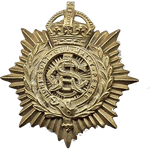Commemorated: | |||
| 1. Memorial: | Wandsworth (Earlsfield) Cemetery | Screen Wall. A. 323. | |
| 2. Grave: | Baghdad (North Gate) War Cemetery | X.F.10 | |
| 3. Memorial: | Holy Trinity Memorial | Guildford | |
| 4. Book: | The (1921) Masonic Roll of Honour 1914-1918 | Pg.137 | |
| 5. Memorial: | The (1940) Scroll - WW1 Roll of Honour | 56A GQS | |
Awards & Titles: | |||
Family :
He was the son of John S K and Elizabeth C Vince, Wakehurst, Cranleigh, formerly of 12, Latchmere Street, Battersea and the husband of Mary Vince.Service Life:
Campaigns:
- The First World War 1914-1918, World-wide.
| Unit / Ship / Est.: Mechanical Transport Depot (Kempton Park). ASC |
| Action : Mesopotamia |
At the outbreak of war the British, together with Indian troops, resolved to protect oil supply in the region by occupying the area around Basra at Abadan. This evolved into a series of campaigns towards Baghdad against the Turkish forces as Mesopotamia (modern Iraq) was part of the Ottoman Empire. Meetings in late 1914 and into 1915 led the Viceroy and Indian government at Simla to reconsider the limited involvement of troops and they decided to order further advances with a view to securing the Shatt-al-Hai, a canal connecting the Tigris and Euphrates river and potentially capturing Baghdad. The British government disagreed and wished to conserve forces for the Western front. The Viceroy was given permission to act as it wished, but told in no uncertain terms that no reinforcements should be expected.
The initial success experienced by the British and Indian forces quickly disintegrated in the face of Ottoman opposition. The Siege of Kut-Al-Amara began on 7th December with the besieging of an 8,000 strong British-Indian garrison in the town of Kut, 100 miles south of Baghdad, by the Ottoman Army. These campaigns produced few tactical benefits, indeed the catastrophic defeat at Kut in 1916 was a major setback. Badhdad was eventually taken in March 1917.
The conditions in Mesopotamia were dreadful. The climate, sickness and disease produced large losses in addition to battle casualties. About as many men died of disease as were killed in action. The Mesopotamia front was part of a strategy hoping for success at lower cost than the Western Front but no decisive victory was achieved.
Detail :
Enlisted for Service on the 6th September 1915 and within one year was promoted from Private to Staff Sergeant. Staff Sergeant, No. 1 Line of Communication Supply Company, Army Service Corps Army no. S4/128216. He died of heatstroke on 19 July 1917 in Mesopotamia (Basra, Iraq). He was 31 and is buried in grave X F 10 North Gate War Cemetery, Baghdad.
See also: They Gave Their Today (Cranleigh).
Holy Trinity Church, Guildford (Ian Nicholls): "Army Service Record gives address originally "Kimbolton", York Road, crossed out and "Wakehurst" Cranleigh inserted. Trade was "Professor of Music" Attested 1/9/15 age 29. Died of heatstroke, Basra. 1911 Census family at 187 High Street, father, John was a Costumier and Charles, age 24,was Professor of Music. Surrey Ad 28/07/1917 reported that Charles the eldest son of Mr and Mrs J. Vince, Kimbolton, York Road, was dangerously ill in hospital suffering from heatstroke. He had been in Mesopotamia for the best part of a year going on as far as Bagdhad. Organist at Parish Church Cranleigh. Surrey Advertiser 04/08/1917 carried his obituary, reporting that he was born in 1896, educated at the Royal Grammar school and studied music at Trinity College, London. He assisted Henry Smith the organist at Holy Trinity, and was the organist and choirmaster at St Lukes, Charlotteville and Cranleigh church. He married Miss Weller of Cranleigh June 1914. He had two brothers, one serving in France, the other engaged in war work at home."
Masonic :
| Type | Lodge Name and No. | Province/District : |
|---|---|---|
| Mother : | Cranleigh No. 3445 E.C. | Surrey |
Initiated | Passed | Raised |
14th September 1910 | 12th October 1910 | 9th November 1910 |
Junior Warden
Source :
The project globally acknowledges the following as sources of information for research across the whole database:
- The Commonwealth War Graves Commission
- The (UK) National Archives
- Ancestry.co.uk - Genealogy, Family Trees & Family History online
- ugle.org.uk - The records of the United Grand Lodge of England including the Library and Museum of Freemasonry
Additional Source:
- Founder Researchers : Paul Masters & Mike McCarthy
- Researcher : Bruce Littley

